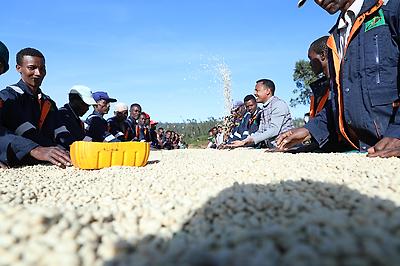Third Wave Coffee
What it means - and what it doesn't
There are plenty of unique terms in the coffee world, but one that you've probably heard again and again is "third wave coffee," or establishments referred to as a "third wave" cafes. All this talk of waves is just a way of referring broadly to shifts or movements in the way coffee is consumed and viewed as a product. (If you're a film nerd, the term works similarly to the French New Wave: a period of time when French films shifted and became something new).The waves of coffee can be broken down roughly as follows:
- First Wave: Coffee hits the American mainstream and becomes widely present in homes around the 1960's. (Think Mr. Coffee).
- Second Wave: Standalone cafes and espresso bars rise to prominence around the 1990's. (Think Starbucks).
- Third Wave: Coffee as an artisanal product rather than a commodity, with craft going into sourcing and brewing the best beans. (Think, well, baristas with moustaches!).

Third Wave coffee is really just good coffee, in our opinion. Coffee that pays attention to the entire coffee production process: working with farmers who grow and process excellent beans, paying them well for their work, roasting those beans to highlight their unique flavors, and brewing the coffee fresh to get the most flavorful cup possible. It's what we strive to do here at Moustache Coffee Club.
Another term you'll hear bouncing around a lot is Specialty Coffee, which actually is a specific term, which denotes coffees that have been graded 80 points or higher on a 100 point scale by professional coffee graders. This is the sort of thing you're likely to find in a local, third wave cafe compared to the trusty pre-ground cans you find in a grocery store.
Another term that's commonly used is single-origin coffee. Single-origin means just that: the coffee all originated in the same place - this can be a small geographic area, a single farm, or even a single plot of land on a single farm. Single-origin coffee is valuable because of its uniqueness - you can taste particular flavors and characteristics depending on where the coffee was grown and how it was processed. This is in contrast to blends, which are a mix of different beans from all over that achieve a more generic "coffee" taste.
Why is third wave coffee so fancy?
Honestly, we're not entirely sure. If you look at any specialty craft like wine, beer, cheese, and the like - there tends to be an air of pretention around the highest-end products. Perhaps it's just something that happens when people go really deep on any one subject. The nice thing is, it doesn't have to be that way, and as far as specialty items go, coffee is much more accessible than other craft products. You can get a really premium shipment of coffee for under $30, which is much cheaper than any fancy bottle of wine. (Check out our tasting series to learn more.) In fact, we're all about making third-wave cafe-quality coffee available at home - no fancy barista experience required. Check out our free trial, and catch the (third) wave!